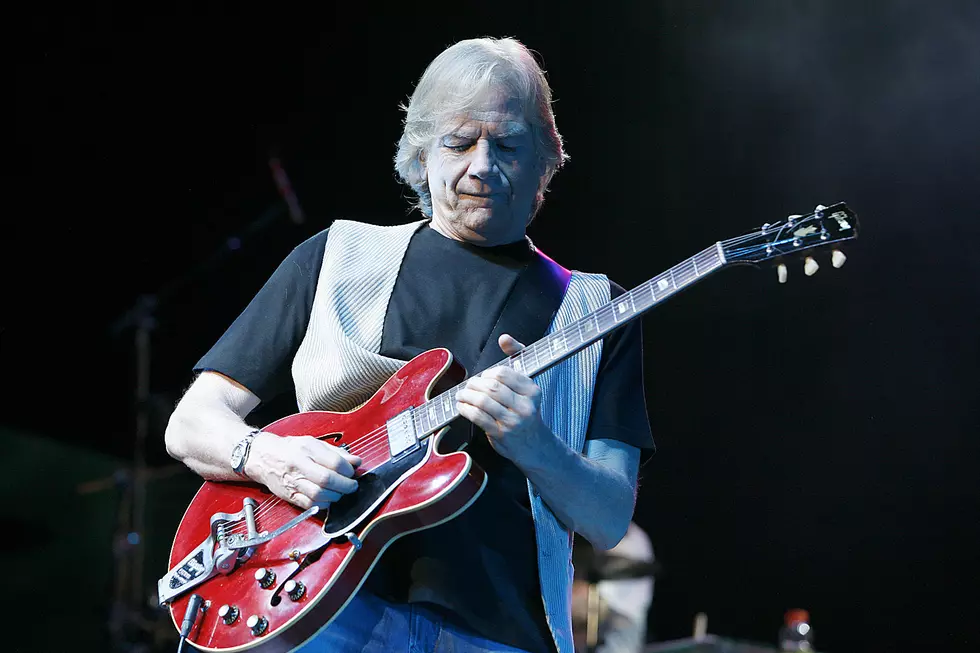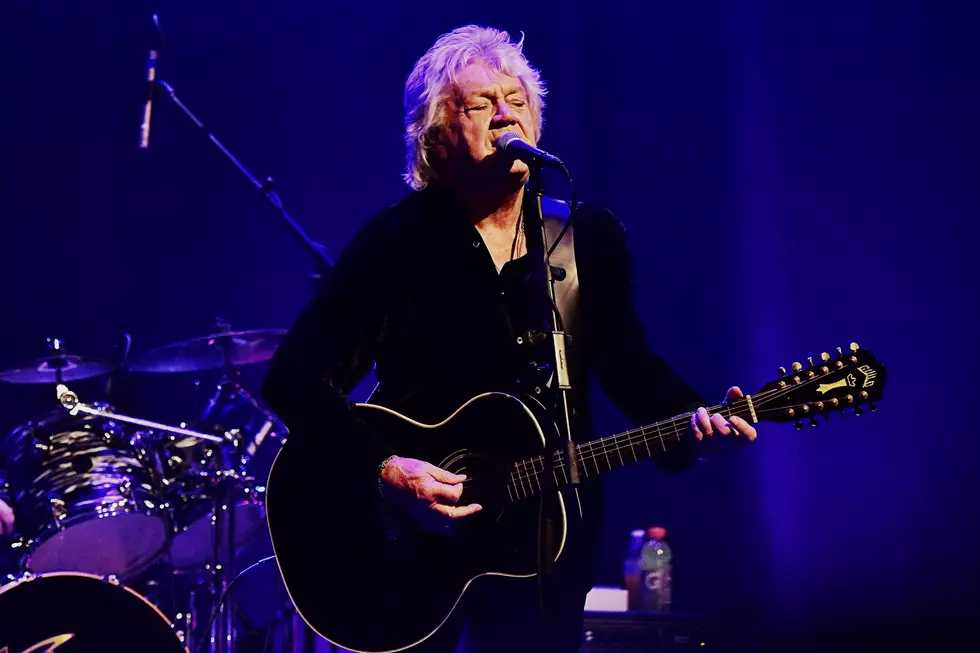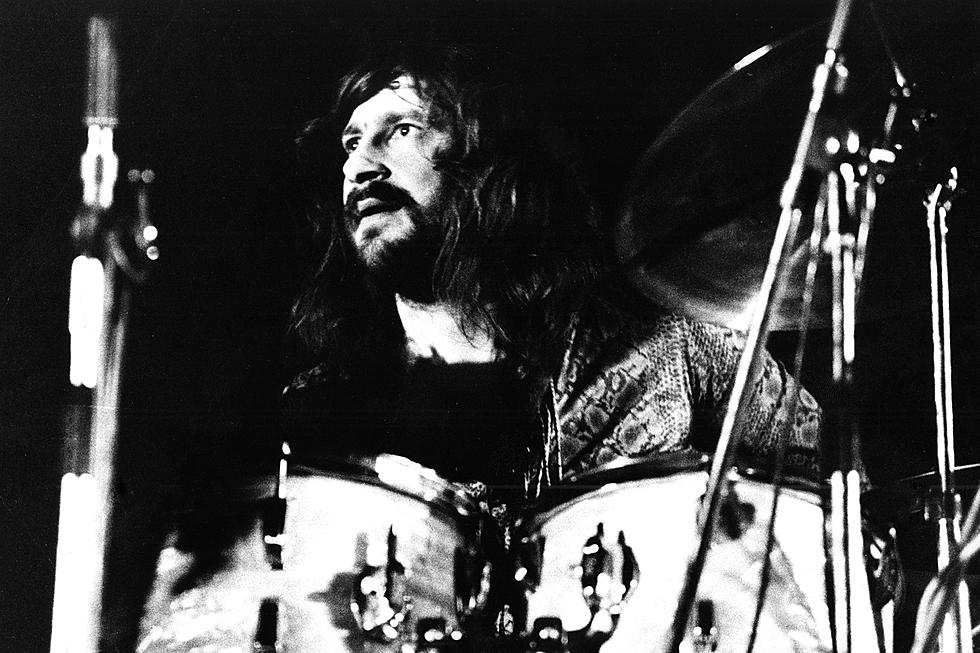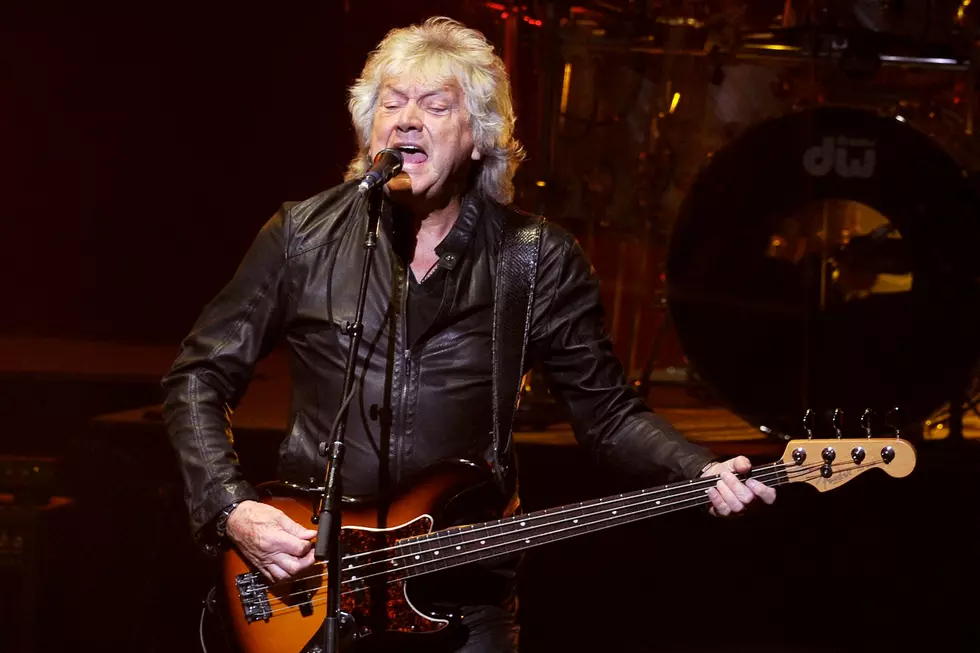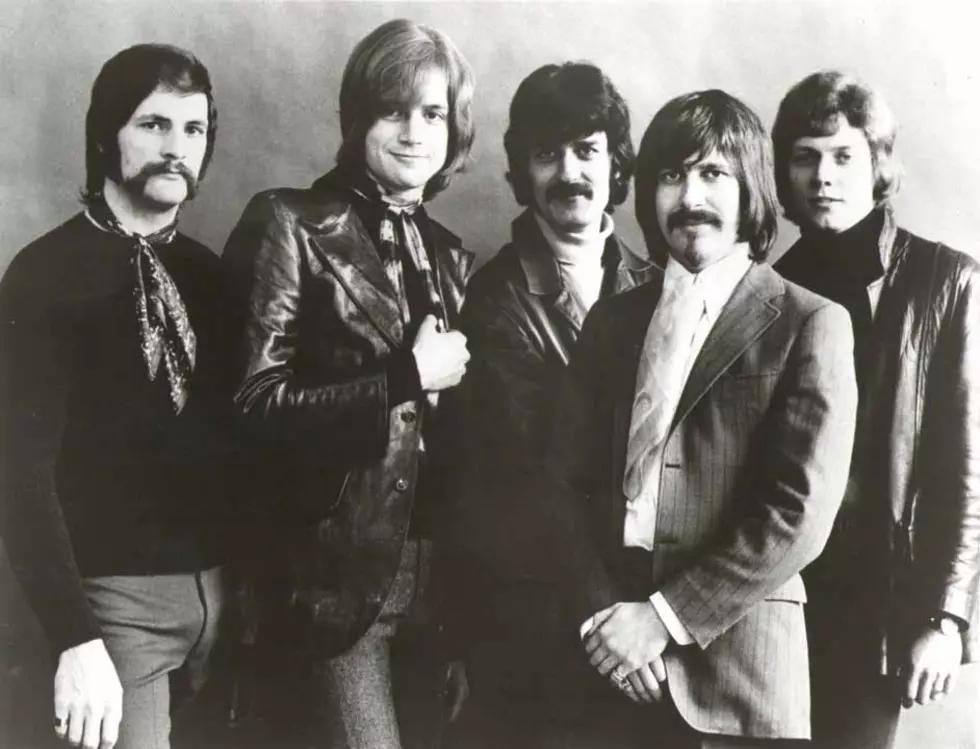Justin Hayward Recalls the Incredible ’80s-Era Rebirth of the Moody Blues: Exclusive Interview
The Moody Blues had already pulled off a successful second act when the '80s heralded a third.
First came a late-'60s reshuffling, after the initial success of their single “Go Now,” which charted at No. 1 in the U.K. and at No. 10 in the U.S. in 1965. The Moody Blues returned with guitarist/vocalist Justin Hayward and bassist/vocalist John Lodge as new additions and a new album, 1967's Days of Future Passed, which would become a landmark release in the group’s catalog. This revised lineup churned out a total of seven albums through 1972, before taking a break to pursue individual activities.
The English classic rockers subsequently retooled again, only to score a No. 1 album in 1981 with Long Distance Voyager, adding two more hits, “The Voice” and “Gemini Dream” to their catalog. It took a label switch and a new producer, however, to up the ante once more. The Moody Blues cut The Other Side of Life with Tony Visconti, and found themselves heading back up the charts with 1986's “Your Wildest Dreams,” something which Hayward says he thought was “almost a throwaway song.” Instead, it lifted the Moody Blues into the Top 10 of the Billboard charts for the first time since Days of Future Passed in 1967. Further success would follow with the Visconti-produced Sur La Mer album in 1988 and the single “I Know You’re Out There Somewhere,” which featured a video that wisely carried forward an earlier storyline from “Your Wildest Dreams.”
“‘Your Wildest Dreams’ had given us the greatest gift — to have a hit and be recognized on MTV and stuff when you’re hitting 40 was marvelous,” Hayward recalled during a 2013 conversation with Ultimate Classic Rock. “And straight — I wasn’t even stoned in the ‘80s that much. ... I missed it in the ‘60s!”
A 1992 symphonic performance with an orchestra at Red Rocks, captured for a live video and album, kept the forward momentum going for the group. The Moody Blues subsequently launched a tour where they played worldwide with local orchestras. A recent box set, The Polydor Years: 1986-1992, collects musical memories and previously unheard tracks from this late '80s renaissance. Now, the band is back on the road this year touring to support the new release.
Hayward will also be continuing to tour solo during breaks in the Moody Blues' touring schedule and, as he told us in the interview below, it’s going to be a busy year. He will be playing shows for at least eight months, both with and without the Moody Blues. Fans can get a glimpse of Hayward’s solo show via the Spirits ... Live concert special currently airing on PBS. The performance was filmed at the Buckhead Theatre in Atlanta in 2013 on the final night of Hayward’s initial round of solo dates supporting Spirits Of The Western Sky, a solo album released earlier that same year.
We caught up with Hayward prior to Moody Blues soundcheck to talk about the band’s renewed success in the late ‘80s and early ‘90s, his successful solo tours and what’s on his schedule for this year.
You’re back out on the road this year with a new box set added to the catalog. Songs like “The Wildest Dreams,” “The Other Side of Life” and “I Know You’re Out There Somewhere” have been constants in the setlist over the years. You guys have always been good about adding a deeper cut or two to the set with each tour. I was curious to know whether this current tour has anything interesting and perhaps off the beaten path a bit, from those later Polydor albums.
Well, there are a couple of things. As a matter of fact, I’m going over there in about 45 minutes to rehearse a couple of things up. But I don’t quite know what they are yet. I think I’ve got a couple of things in mind and so we’ll just see how it goes. But it’s nice to concentrate on that particular time in our career, because it was a very lucky time for us.
It was wonderful to have that chance at success a second time around, with what was to us, a new label. Because Decca was sold and we were sold with Decca, to Polygram. It didn’t start too well with The Present, but then with “Your Wildest Dreams” and "The Other Side of Life," it just got brilliant, you know, beyond our wildest dreams, really.
What comes to mind when you look back at each of the studio albums that are featured in that set, from The Other Side of Life through Keys Of The Kingdom?
Tony Visconti, for one. A different way of recording. I mean, there was one song on The Present that we took maybe up to 30 weeks to record. It was insane. I think we got into that habit of just kind of wasting time in the studio and not really giving it. When I met Tony, I did a project with him for the BBC and he had a way of working. He’d start at 11 and finish at 7 and that was it. If you hadn’t done it, he’d say, “Well, save it until tomorrow.” It was intense and that’s exactly what we needed.
It seemed like it produced some really great results on those records. You’ve got some beautiful songs on those records, stuff like “Vintage Wine” and “Deep,” to name a couple off of Sur La Mer and “Never Blame The Rainbows For The Rain” from Keys Of The Kingdom, those are a few that come to mind.
Yeah, I think so. You know, it was a new way of working. He also had mastered this little Roland programmer, so we had that and we had a Publison sampler, so we sampled quite a lot of Graeme [Edge]'s drums and were able to use that and not waste too much time over struggling for a drum sound. He’s a bass player too, so that really helped, because he could add that dimension.
But also for the first time, I think for me personally, I was able to bring my demos from home, that I’d always done to timecode, into the studio and they would actually be on the records and then we would make the records, my tracks anyway, around them. It was very nice.
That seems like it was a productive period for you as a songwriter.
I think it was. I have to give Tony Visconti the credit for that. You know, Patrick Moraz contributed to that whole feel, too. He had some great sounds, but he was kind of apart from the band in a way – and I think Tony really encouraged the rest of us to really express ourselves quickly and concisely.
How did the band end up working with a few different producers on the Keys record?
Tony went to live in the U.S. and he got married to May Pang. I was best man at his wedding. Then I had met Alan Tarney, who I had also done something [with] away from the Moodies and he was a good friend anyway, who was one producer. Then Christopher Neil, a lovely guy, he was brought to us from the label and that was nice too. So the obvious thing to do, was to do a couple of things with Tony before he moved and then other things with other people. I don’t think it was the most successful album we’ve ever made, really. But there’s still some very nice things on it.
The Red Rocks concert seems like something that much like the success of “Your Wildest Dreams” and “I Know You’re Out There Somewhere,” that symphony concert launched an interesting new period for the band. At the time, what was it like putting that initial show together at Red Rocks?
Scary. Tremendous. It was amazing that the promoter and even our late manager, Tom Hulett, who died not long after that -- both of them had assumed wrongly that we had worked with orchestras before and we hadn’t. But the promoter, because of his connection with the Colorado Symphony, was really committed and wanted us to commit to working with the Colorado Symphony. And PBS were really up for it too, the local PBS station.
We took it on and it was nerve-wracking and a hell of a mix afterwards, that I had to do. [Laughs.] You know, it was upwards of a 100-plus tracks that it was all recorded on. Fortunately, we had moved into the digital age, so we were able to cope with it, once I’d done pre-mixes of the orchestra and things like that. But it really turned a corner for us and put us right on the map in a different way. People saw us in a different light, and I think it was a great move for us -- a wonderful move for us.
Immediately after that, we had so many orchestras around the world getting in touch with us suggesting that we might like to work with them too. That was just brilliant.
The concert that was captured for your solo PBS special really is a great watch. The band, even working in a smaller format, really has a full sound. How did you go about putting the arrangements together for both the Moody Blues songs and your own solo material when it came to planning that tour? It really seems like it came together well.
It did. The other three musicians on that particular show, the Atlanta show -- now I just work with three, Mike Dawes, and Julie Ragins. Julie is really the central character in a way, in that she found a lot of the sounds. It was wonderful working with Alan [Hewitt], because he knew all of the bits. But in essence, it came down to me and Mike and then Julie and Alan finding out how they could enhance what we were doing as the two guitar players.
Once I found Mike Dawes, he came to my house one day and we played and you know, you get a kind of shiver up your spine and just hearing him play and being in his presence and watching somebody that you think, “That’s just not possible on guitar!” Every guitar player knows that feeling. I did a festival a few years ago with Derek Trucks, and I stood on the side of the stage and thought, “How the hell does he do that? It’s not possible!” But Mike is like that too. I had to rise to the occasion with Mike, because his timing was spot on and everything about it was lovely.
He managed to cover all of the parts on the record that I had double-tracked with myself, the acoustic parts. He told me right at the beginning, “You know, I want to leave you free. I’ll take care of the rhythm and the percussive feel of it. You just really try and perform the song with the rhythm guitar in the way that you did it on the demo when you first wrote the song.” That was really comfortable. So I think, sometimes less is more. I think it turned out to be that with the PBS special.
After that, the PBS station in Minneapolis came to see a later show that I did and that was when they really decided to go with it. You know, it was perfect for PBS, that kind of thing where you can hear every nuance. They’ve been very kind to me and the [Moody Blues]. But this year, they’ve been particularly kind and it’s wonderful.
The latest solo record has been very well received. Have you continued to write towards another record?
I think so, yeah. I have a few things in the can. I’m going to work on a few things as the year goes on and I’ve got a couple of other projects in the can. It’s just timing of when I release those or put them up. But at the moment, I’ve got so much work. I’m going to be on the road for more than eight months this year. So it’s just a question of [when] Alberto [Parodi], my engineer, and I can get together and do that. So yes, absolutely. I have to do that, because basically I’m just a guy who writes songs and I have to present those somehow.
I think for fans that perhaps didn’t get a chance to see some of the limited solo touring that you did for some of the past solo albums you’ve done, it’s been great to see how much touring you’ve been able to do around this record.
Well, thank you. It’s from the promoters that have very kindly offered me the venues, and venues that really seem to work with this solo show. They’re a real pleasure to play. They really are.
As you continue to work solo, what sort of plans do you have to dig further back in your solo catalog? Would you play a song off of your Moving Mountains album, for example?
Oh, absolutely. I came through London on the way here and I met a good friend of mine, Martin Wyatt, who was part of the production of Moving Mountains and he said, “We really must do something with that,” because we both enjoyed it very much. It was such an enjoyable thing. I’m definitely going to revisit that. I’ve got to find the masters. I don’t know where they are. So, I have to find them first, and see what they sound like. Martin and I have an idea, but we need to go find them in London. I’ll figure it out when I’m passing through, the next time I’m back in the U.K.
See the Moody Blues and Other Rockers in Our Top 100 Albums of the '60s
The 10 Worst Rock and Roll Hall of Fame Snubs
More From Ultimate Classic Rock


